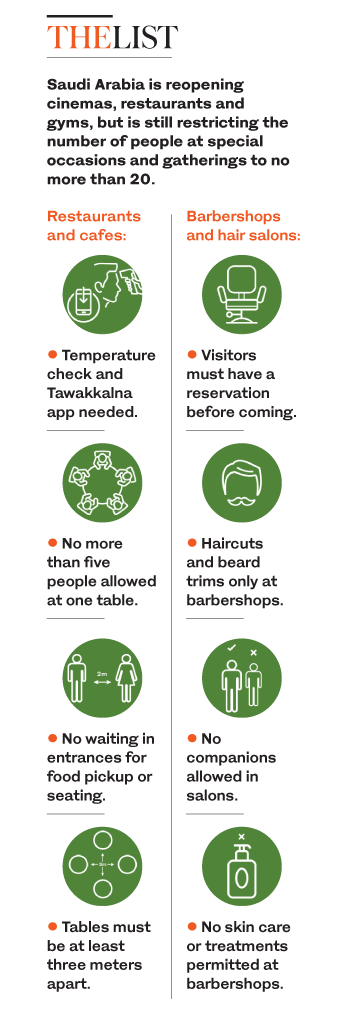JEDDAH: After enduring a month of tightened restrictions in the wake of a rise in coronavirus cases earlier this year, Saudis are elated at the prospect of their favorite restaurants, cafes and cinemas reopening on Sunday.
Residents told Arab News of their experiences during the 30-day period and what they are most looking forward to on Sunday.
Asia Khalil, 33, breathed a sigh of relief when she heard that her six-year-old twins will finally be able to spend time at an indoor amusement park, saying that she ran out of ideas to keep her active children occupied.
She told Arab News: “Their father and I tried everything imaginable. It’s a little more difficult this time around because they’re restless, and with school starting late in the day, they need something to tire them out before bedtime and going out wasn’t an option for us.
“We’ll be even more careful than ever before this time around,” she added.
HIGHLIGHT
The Kingdom suspended recreational events on Feb. 3 to halt the spread of COVID-19. The suspension was extended on Feb. 14 for 20 days.
Omar Yasseen, a 27-year-old barista at Brew92, said he was “very excited” to welcome customers back and see his cafe return to life.
“Though it was necessary, the ban did affect us negatively. Time went by slowly,” he told Arab News. “I’m excited to see customers walking in again, staying and lighting up the place.”
Yasseen hopes that people are more careful about following precautionary measures after reopening so that everyone can continue to enjoy public places.
“We must be careful in public places so that we enjoy dining experiences again at restaurants and more.”

The decision to take extra measures to control the spread of coronavirus also affected those with active and social lifestyles, including 26-year-old electrical engineer Ahmed Basfar.
“It had a drastic impact on my daily life since I’m a very outdoor kind of person. I’m used to going to the gym at least four days a week and meeting up with friends at a local coffee shop,” he told Arab News.
“Initially, I was thinking that I can stay at home with my family for a good 10 days and can have quality time with them, but then when I knew that the period was extended for 20 more days, I started to panic.
“I thought I was going to lose all of the progress I made during the past six months in those 30 days. So I went ahead and bought a whole lot of home fitness equipment.”
Basfar ordered a treadmill, aerobic step platform, sports mat, dumbbells, a jump rope and other equipment to stay active at home.
The news that leisure facilities would reopen has excited Basfar, who said that he “cannot wait” to get back into the gym. However, he also praised the benefits of working out at home.
“Although working out at home is not ideal for me since I need to use heavy machines to keep from gaining weight, it has kept me fit until gyms reopens again,” he said.
Nada Jannadi, a 32-year-old psychology counselor, said she faced a challenging time during the 30-day period.
“I’m not so flexible when it comes to my daily routine. So I had to make some changes with my time and find a way to exercise at home,” she told Arab News.
“When they said it’s going to be 10 days with the possibility of an extension, I was telling myself to be patient and that it’s only 10 days. I soon realized that the 10 days were extended so I decided to buy my own equipment and redecorated my apartment to have a small corner designated for my new gear. Some days I get bored from working out at home so I go out for a 60-minute walk in the neighborhood.”
Both Jannadi and Basfar agreed that, although the last month has been a tough period, they will take extra precautions when they return to the gym, and will make sure to follow health and safety protocols.
“We have to be careful, because it’s our health and the people we love before it’s governmental. The government cares about us so we have to do what they are asking us to do. We survived this before and we are going to survive this, too,” Jannadi said.




























